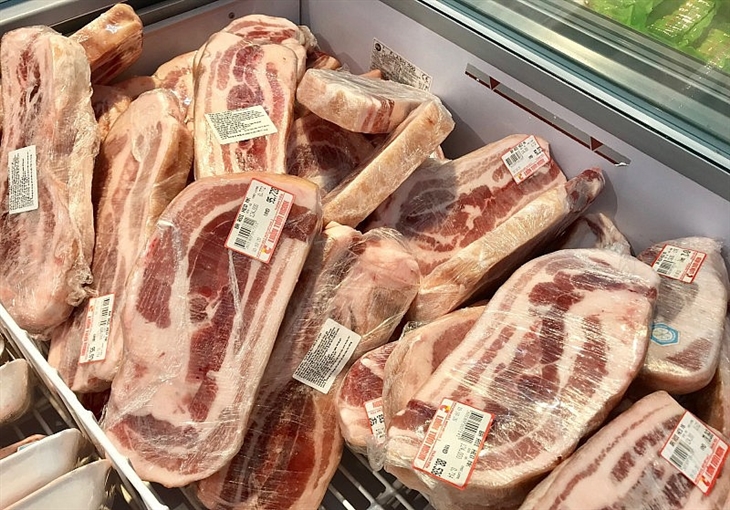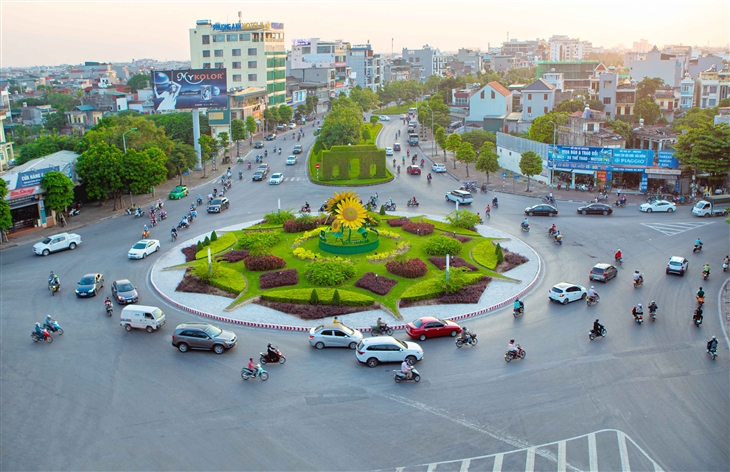Concerns that Vietnam become a super importer of livestock products
Tuesday, April 9,2024
AsemconnectVietnam - Along with official imports, widespread smuggling will cause Vietnam to become a super importer of livestock products.
Every week, about 60,000 discarded laying hens are smuggled
According to data from Department of Livestock (Ministry of Agriculture and Rural Development), in the first quarter of 2024, estimated import turnover of livestock products is about 702 million USD, down 6.7% over the same period in 2023. Out of which, meat, meat by-products and edible animal by-products are 336 million USD; milk and milk products is 236 million USD.
However, according to opinions of livestock industry associations, this is only tip of "iceberg". Because, it can be said that compared to countries with developed livestock farming, our country's regulations on importing livestock products are not strict and have many loopholes. Meanwhile, to export poultry meat and eggs, we have to endure many strict technical barriers in importing countries, making our livestock products weak and disadvantaged right on home turf.
According to 2023 statistics, import turnover of livestock products is 3.53 billion USD, while exports are only 515,000 USD. In addition to official import figure mentioned above, there is also a very large volume of livestock and livestock products imported illegally (smuggled).
According to reports from authorities and media, in 2023 and the first weeks of 2024, every day, 6,000 - 8,000 pigs (weight 100 - 120 kg/head) are smuggled into Vietnam, not to mention the large amount of buffaloes, cows, waste chickens, chicken breeds... Sharing at livestock sector briefing for second quarter and listening to reports of some recommendations of livestock industry associations and organizations organized by Ministry of Agriculture and Rural Development in Hanoi, Mr. Nguyen Thanh Son - Chairman of Poultry Breeding Association - emphasized the need to control and prevent import of both official and unofficial livestock products.
With official imports, according to Mr. Nguyen Thanh Son, current solution is that Ministry of Agriculture and Rural Development is assigning Department of Animal Health to amend Circular 25/2016 - this is an opportunity to review and supplement stricter regulations on imported livestock products.
In this amendment, Mr. Nguyen Thanh Son also proposed that authorities change regulation on sampling inspection percentage, accordingly, instead of 1 container for every 6 containers, 1 container will be sampled for inspection, now 100 will be sampled % of containers of imported meat products. This is a way to both control quality and limit disease risks; At the same time, raising import prices will protect domestic production.
In addition, it is necessary to add a number of indicators related to food safety and hygiene, such as including Salmonella indicators and E.coli indicators in imported meat products.
Although currently, some enterprises oppose this recommendation, however, Mr. Son believes that this is something that must be done because this is an indicator related to food safety. At the same time, review and add a number of stricter regulations, thereby creating technical barriers for livestock products.
Regarding smuggled imports, Mr. Nguyen Thanh Son said that last year, Poultry Breeding Association and competent forces took drastic action to control smuggling of poultry from Northern border quite well, thereby creating conditions for domestic livestock farming.
However, illegal import of chickens, especially discarded laying hens, at the southern border still occurs. According to current updated estimates, every week we smuggle about 60,000 discarded laying hens from the Vietnam-Laos border, equivalent to 240 tonnes/week and 720 tonnes/month, of which many chickens are of Thailand origin. This number is quite large.
According to Mr. Nguyen Thanh Son, some enterprises are officially imported because they raise chickens in Thailand and then import them to Vietnam, but there are also some enterprises that mix waste laying hens and import them to Vietnam through border.
Therefore, fight against smuggling needs to be continuous. It is necessary to organize a campaign to inspect and control both unofficial and official imports in the Central and Southern regions.
Concerns that Vietnam will become a super importer of livestock products
Situation of livestock production and trade in the country recently and currently is facing many challenges and difficulties. In particular, massive import of livestock products into our country is currently a serious problem, causing many risks and consequences.
Accordingly, it causes spread of diseases, especially dangerous diseases, including African swine fever, bird flu and lumpy dermatitis on cattle. Besides, it causes unfair competitive pressure on domestic livestock products. Causing great risks to food quality and safety for consumers. Losing investment opportunities and motivation for domestic businesses and livestock farmers will directly affect national food security in the long run.
To improve competitiveness of domestic livestock industry, Mr. Nguyen Xuan Duong - Chairman of Vietnam Livestock Association - said that in addition to abolishing declaration of conformity for veterinary drugs and animal feed to help reduce arise increased costs for livestock products, we should also not apply value added tax (VAT) to agricultural products, including livestock products in the preliminary processing stage.
In addition, authorities also need to take measures to control imported livestock products, in which, with official goods, it is necessary to increase construction of trade barriers, which is not easy but must be done. This is legitimate self-defense to protect domestic production.
"The US standard for frozen meat shelf life is only 4-5 months, but how many months do we import to keep it in storage?", Mr. Nguyen Xuan Duong asked.
Mr. Nguyen Xuan Duong also proposed that small-quota imports should be banned. “We do not lack food, domestic production is enough. In context of livestock industry growing by 3-5%, while population is not increasing, there is no fear of food shortage," Mr. Nguyen Xuan Duong emphasized and said, these are bottlenecks that need to be resolved in short term and long term, otherwise Vietnam will become a super importer of livestock products.
Source: Vitic/ congthuong.vn
According to data from Department of Livestock (Ministry of Agriculture and Rural Development), in the first quarter of 2024, estimated import turnover of livestock products is about 702 million USD, down 6.7% over the same period in 2023. Out of which, meat, meat by-products and edible animal by-products are 336 million USD; milk and milk products is 236 million USD.
However, according to opinions of livestock industry associations, this is only tip of "iceberg". Because, it can be said that compared to countries with developed livestock farming, our country's regulations on importing livestock products are not strict and have many loopholes. Meanwhile, to export poultry meat and eggs, we have to endure many strict technical barriers in importing countries, making our livestock products weak and disadvantaged right on home turf.
According to 2023 statistics, import turnover of livestock products is 3.53 billion USD, while exports are only 515,000 USD. In addition to official import figure mentioned above, there is also a very large volume of livestock and livestock products imported illegally (smuggled).
According to reports from authorities and media, in 2023 and the first weeks of 2024, every day, 6,000 - 8,000 pigs (weight 100 - 120 kg/head) are smuggled into Vietnam, not to mention the large amount of buffaloes, cows, waste chickens, chicken breeds... Sharing at livestock sector briefing for second quarter and listening to reports of some recommendations of livestock industry associations and organizations organized by Ministry of Agriculture and Rural Development in Hanoi, Mr. Nguyen Thanh Son - Chairman of Poultry Breeding Association - emphasized the need to control and prevent import of both official and unofficial livestock products.
With official imports, according to Mr. Nguyen Thanh Son, current solution is that Ministry of Agriculture and Rural Development is assigning Department of Animal Health to amend Circular 25/2016 - this is an opportunity to review and supplement stricter regulations on imported livestock products.
In this amendment, Mr. Nguyen Thanh Son also proposed that authorities change regulation on sampling inspection percentage, accordingly, instead of 1 container for every 6 containers, 1 container will be sampled for inspection, now 100 will be sampled % of containers of imported meat products. This is a way to both control quality and limit disease risks; At the same time, raising import prices will protect domestic production.
In addition, it is necessary to add a number of indicators related to food safety and hygiene, such as including Salmonella indicators and E.coli indicators in imported meat products.
Although currently, some enterprises oppose this recommendation, however, Mr. Son believes that this is something that must be done because this is an indicator related to food safety. At the same time, review and add a number of stricter regulations, thereby creating technical barriers for livestock products.
Regarding smuggled imports, Mr. Nguyen Thanh Son said that last year, Poultry Breeding Association and competent forces took drastic action to control smuggling of poultry from Northern border quite well, thereby creating conditions for domestic livestock farming.
However, illegal import of chickens, especially discarded laying hens, at the southern border still occurs. According to current updated estimates, every week we smuggle about 60,000 discarded laying hens from the Vietnam-Laos border, equivalent to 240 tonnes/week and 720 tonnes/month, of which many chickens are of Thailand origin. This number is quite large.
According to Mr. Nguyen Thanh Son, some enterprises are officially imported because they raise chickens in Thailand and then import them to Vietnam, but there are also some enterprises that mix waste laying hens and import them to Vietnam through border.
Therefore, fight against smuggling needs to be continuous. It is necessary to organize a campaign to inspect and control both unofficial and official imports in the Central and Southern regions.
Concerns that Vietnam will become a super importer of livestock products
Situation of livestock production and trade in the country recently and currently is facing many challenges and difficulties. In particular, massive import of livestock products into our country is currently a serious problem, causing many risks and consequences.
Accordingly, it causes spread of diseases, especially dangerous diseases, including African swine fever, bird flu and lumpy dermatitis on cattle. Besides, it causes unfair competitive pressure on domestic livestock products. Causing great risks to food quality and safety for consumers. Losing investment opportunities and motivation for domestic businesses and livestock farmers will directly affect national food security in the long run.
To improve competitiveness of domestic livestock industry, Mr. Nguyen Xuan Duong - Chairman of Vietnam Livestock Association - said that in addition to abolishing declaration of conformity for veterinary drugs and animal feed to help reduce arise increased costs for livestock products, we should also not apply value added tax (VAT) to agricultural products, including livestock products in the preliminary processing stage.
In addition, authorities also need to take measures to control imported livestock products, in which, with official goods, it is necessary to increase construction of trade barriers, which is not easy but must be done. This is legitimate self-defense to protect domestic production.
"The US standard for frozen meat shelf life is only 4-5 months, but how many months do we import to keep it in storage?", Mr. Nguyen Xuan Duong asked.
Mr. Nguyen Xuan Duong also proposed that small-quota imports should be banned. “We do not lack food, domestic production is enough. In context of livestock industry growing by 3-5%, while population is not increasing, there is no fear of food shortage," Mr. Nguyen Xuan Duong emphasized and said, these are bottlenecks that need to be resolved in short term and long term, otherwise Vietnam will become a super importer of livestock products.
Source: Vitic/ congthuong.vn
Forty-five provinces and cities issue logistics service development plans
Foreign investment driven towards new breakthrough phase
Special consumption tax can hurt beverage industry
DAILY: Vietnamese pepper prices fluctuated strongly on April 8, 2024
DAILY: Vietnamese coffee prices remained unchanged on April 8, 2024
6 groups of policies proposed to promote industrial park development
Over 163,000 new stock trader accounts created during March
Vietnam ranked 6th among fastest growing Asian economies in 2024
Bright prospects for An Giang mangos to conquer more demanding markets
HCM City’s market stabilisation programme wins support of businesses
In brightest picture, import and export in 2024 forecast to reach over 790 billion USD
Enterprises seize opportunities to exploit billion-people markets
DAILY: Vietnamese pepper prices rose by 500 VND on April 5, 2024
DAILY: Vietnamese coffee prices decreased by 1000 VND on April 5, 2024

Plan of Hai Duong province for a period of 2021 - 2030, ...
Organize space reasonably and harmoniously, focusing on connecting Hai Duong in common development space, actively contributing to the ...Plan of Hau Giang province in a period of 2021 - 2030, ...
Sustainable forestry development program in a period of ...

Students promote Vietnamese culture in Russia
The Vietnamese Students’ Association in the Peoples' Friendship University of Russia (RUDN) held an event called "Bamboo Legend” on ...Exhibition on General Vo Nguyen Giap opens in Nghe An
Da Lat festival: Classical music taken out of auditorium ...



